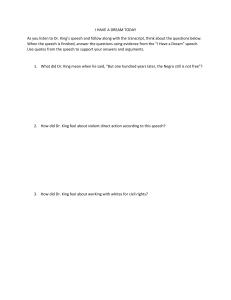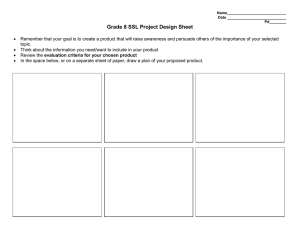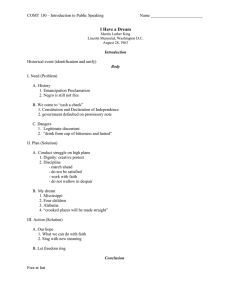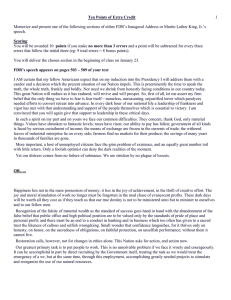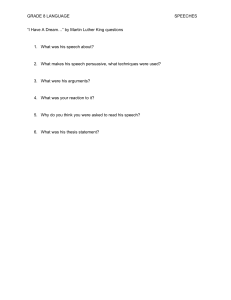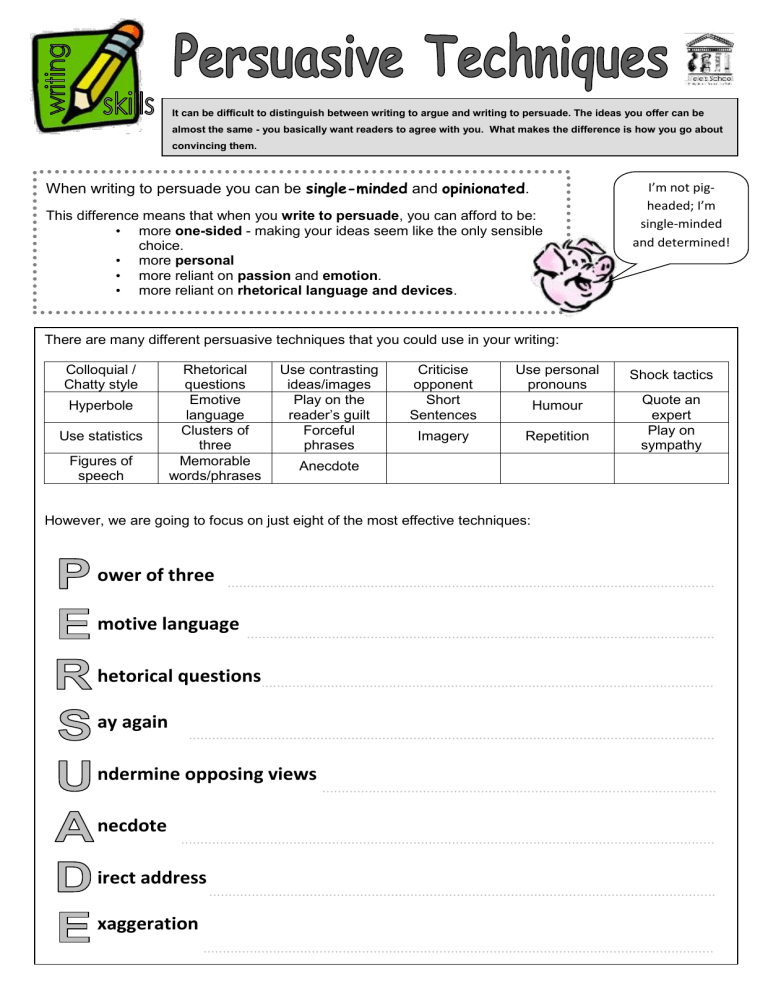
It can be difficult to distinguish between writing to argue and writing to persuade. The ideas you offer can be
almost the same - you basically want readers to agree with you. What makes the difference is how you go about
convincing them.
When writing to persuade you can be single-minded and opinionated.
This difference means that when you write to persuade, you can afford to be:
• more one-sided - making your ideas seem like the only sensible
choice.
• more personal
• more reliant on passion and emotion.
• more reliant on rhetorical language and devices.
I’m not pigheaded; I’m
single-minded
and determined!
There are many different persuasive techniques that you could use in your writing:
Colloquial /
Chatty style
Hyperbole
Use statistics
Figures of
speech
Rhetorical
questions
Emotive
language
Clusters of
three
Memorable
words/phrases
Use contrasting
ideas/images
Play on the
reader’s guilt
Forceful
phrases
Criticise
opponent
Short
Sentences
Use personal
pronouns
Shock tactics
Humour
Imagery
Repetition
Quote an
expert
Play on
sympathy
Anecdote
However, we are going to focus on just eight of the most effective techniques:
ower of three
motive language
hetorical questions
ay again
ndermine opposing views
necdote
irect address
xaggeration
Born on 15 January 1929 in Atlanta, Georgia, King was an American clergyman, Nobel Peace Prize
winner and one of the principal leaders of the American civil rights movements. On 28 August 1963,
Martin Luther King delivered his magnificent, and very famous, "I have a dream speech" on the steps of
the Lincoln Memorial in Washington.
Listen carefully to Martin Luther King’s speech and answer the questions below.
What is the speech about? Are there any key words or phrases in the speech that provide clues as to
the subject matter?
How does the author/speaker feel about the subject? What can we infer from the speaker’s
tone voice? Consider specific words (for example ‘liberty’ and ‘negro’) what are the connotations?
This speech makes me feel… Your initial ‘gut’ reaction.
Consider the extracts from Martin Luther King’s speech below. Identify the
PERSUADE techniques used, highlight/underline the corresponding sections
and annotate.
Five score years ago, a great American, in whose symbolic
shadow we stand today, signed the Emancipation
Proclamation. This momentous decree came as a great
beacon light of hope to millions of Negro slaves who had
been seared in the flames of withering injustice. It came as
a joyous daybreak to end the long night of their captivity.
But one hundred years later, the Negro still is not free. One
hundred years later, the life of the Negro is still sadly
crippled by the manacles of segregation and the chains of
discrimination. One hundred years later, the Negro lives on
a lonely island of poverty in the midst of a vast ocean of
material prosperity. One hundred years later, the Negro is
still languished in the corners of American society and finds
himself an exile in his own land. And so we've come here
today to dramatize a shameful condition.
In a sense we've come to our nation's capital to cash a
check. When the architects of our republic wrote the
magnificent words of the Constitution and the Declaration of
Independence, they were signing a promissory note to
which every American was to fall heir. This note was a
promise that all men, yes, black men as well as white men,
would be guaranteed the "unalienable Rights" of "Life,
Liberty and the pursuit of Happiness." It is obvious today
that America has defaulted on this promissory note, insofar
as her citizens of color are concerned. Instead of honoring
this sacred obligation, America has given the Negro people a
bad check, a check which has come back marked
"insufficient funds."
But we refuse to believe that the bank of justice is
bankrupt. We refuse to believe that there are insufficient
funds in the great vaults of opportunity of this nation. And
so, we've come to cash this check, a check that will give us
upon demand the riches of freedom and the security of
justice.
I am not unmindful that some of you have come here out of
great trials and tribulations. Some of you have come fresh
from narrow jail cells. And some of you have come from
areas where your quest -- quest for freedom left you
battered by the storms of persecution and staggered by the
winds of police brutality. You have been the veterans of
creative suffering. Continue to work with the faith that
unearned suffering is redemptive. Go back to Mississippi, go
back to Alabama, go back to South Carolina, go back to
Georgia, go back to Louisiana, go back to the slums and
ghettos of our northern cities, knowing that somehow this
situation can and will be changed.
Let us not wallow in the valley of despair, I say to you
today, my friends.
And so even though we face the difficulties of today and
tomorrow, I still have a dream. It is a dream deeply rooted
in the American dream.
I have a dream that one day this nation will rise up and live
out the true meaning of its creed: "We hold these truths to
be self-evident, that all men are created equal."
I have a dream that one day on the red hills of Georgia, the
sons of former slaves and the sons of former slave owners
will be able to sit down together at the table of brotherhood.
I have a dream that one day even the state of Mississippi, a
state sweltering with the heat of injustice, sweltering with
the heat of oppression, will be transformed into an oasis of
freedom and justice.
I have a dream that my four little children will one day live
in a nation where they will not be judged by the colour of
their skin but by the content of their character.
I have a dream today!
I have a dream that one day, down in Alabama, with its
vicious racists, with its governor having his lips dripping
with the words of "interposition" and "nullification" -- one
day right there in Alabama little black boys and black girls
will be able to join hands with little white boys and white
girls as sisters and brothers.
I have a dream today!
Why are these techniques effective? How do they make you feel?
When you set out to persuade someone, you want them to accept your
opinion on an issue: you want to change that person's mind to your way
of thinking.
When writing to persuade, you need to be very aware of your audience; you want to be
forging a link with them by establishing a common goal, not irritating them by completely ignoring
their needs.
There are three areas we should attempt to appeal to when trying to get our audience on side:
Most people believe themselves to be reasonable, so appealing to a person's sense of reason is the most
effective means of convincing them to change their way of thinking ('If we don't do this... then... ).
We all share certain common ideas of what is just and fair! Appealing your audience’s sense of what is right
and fair can be a powerful persuasive device, e.g. 'Like you, I share a sense of horror and repulsion at what is
happening...'.
Persuasion often succeeds by the careful and considered use of emotion - especially showing how
passionate you feel for your point of view.
Recognise that your audience feel they
hold a reasonable view already, but try to
dissuade that view by showing how
much more reasonable your own position
is. Provide evidence to support your
ideas to suggest that they are
reasonable and logical.
An effective way of appealing to your
audience’s sense of reason, while still
presenting your view as the only correct
view, is to use
rather than objective ones.
(However, do not overuse this as it can make you
seem untrustworthy / insincere.)
You need to try to convince your audience
that you and they are very similar, sharing
parallel ideas and views
One way to do this is to create a sense of a
shared personal or cultural experience.
You can make your audience feel as though
they have shared experiences with you by
including
.
These illustrative ‘real’ stories add a human
and personal dimension that can be
irresistible and fascinating.
Persuasion works best when you know your
audience well so consider your reader, think about
what their current views are and what has brought
them to think that way - think about addressing
them as a 'friend using the pronoun 'You'.
people often put their
own interests first. What
can you offer your
readers to help them
change their mind?
show that you share
your reader's
concerns - even if
your view is
different.
no one will listen
to an arrogant,
impolite big-head.
Use an appropriate tone
to suit your audience and
purpose.
Consider the
difference between
the words building,
The most important persuasive technique is
to sound authentic and passionate (as if
house and home.
you really mean what you say!) and this
requires a confident tone: sound like you
are sincere and believable.
Some words have connotations that evoke
an emotional response.
Because we often have an emotional
association to words, our choice of
vocabulary can be a powerful tool for
persuasion. We can use words to make our
audience feel guilty about a situation, angry
The words all come from the same semantic field,
with similar denotations; however, the connotations
of words are very different.
and even hopeful.
Hele’s Herald
The first for all your local news.
‘Improve’ at least 4 of these headlines
2
p
5
p
25p
Old man hit by robbers
A hundred peasants killed by troops
Train seats cut by teenagers
House prices fall throughout the
country
Shortage of money creates problems
in schools
Trouble on roads after snow fall
Player hits referee
by making them more emotive.
You have to persuade the overworked customer services assistant at your local department
store to refund/exchange your unwanted Christmas present.
How will you start your conversation in order to get
her ‘on side’?
What tone will you use?
What persuasive techniques would it be most
appropriate to employ?
Make your notes in the space provided below.
The distinction between writing to persuade and writing to argue is incredibly subtle.
In both cases you need to present a supported written argument. What is the difference when
writing to persuade?
I’m sure you all agree that supermarkets need to start
taking responsibility for the environment, and stop over
packaging goods.
Recycling and the conservation of our planet’s natural
resources are key concerns to many responsible citizens,
yet the supermarkets ignore this. They need to stop
wrapping goods in multiple layers of unnecessary
polythene, plastic and card board.
How many of you, like me, have done your bit for the
environment diligently, but found yourself in the
situation where you are forced to throw recyclable
products into the non-recyclable bin, because you have
simply run out of space in your recycling bin?
More than 77% of consumers questioned said that they
were irritated by the amount of wasteful packaging they
had to dispose of, while 52% of shoppers try to avoid
buying over-packaged goods.
Why then do supermarkets insist on continuing this
pointless practice?
Since when has an apple pie been such a perishable
product that it requires four layers of packaging to
protect it? Last night, fancying one such sweet pie, I
made the mistake of popping to the shops and buying a
box of pastries by a well-known brand. By the time I had
helped my poor apple pie from its foil, plastic, polythene
and card board prison, I had lost all appetite for the
thing. Furthermore, two of the offending ‘protective’
elements weren’t even recyclable.
You are chairman of the school student council. It has been suggested, by the
student body, that students should be allowed to not wear ties in the summer.
As chairman, it is your job to put this proposal forward to the school
governors and persuade them that this is a justified and beneficial
suggestion.
